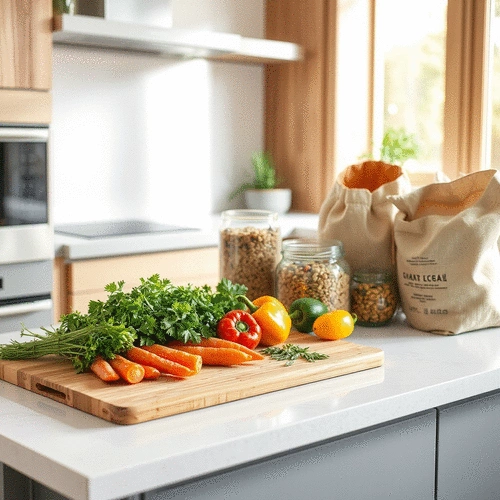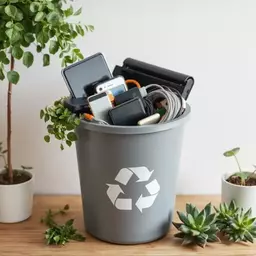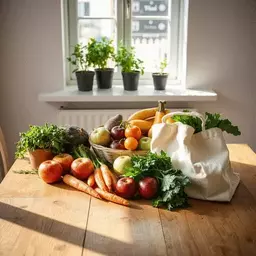As the planet faces increasing environmental challenges, our kitchens can be powerful agents of change. By embracing a waste-free kitchen, we not only support sustainability but also benefit our finances and health. Let’s explore the compelling reasons to transition to this mindful approach!
What You Will Learn
- The significant positive impact a waste-free kitchen has on the environment, including reduced landfill contributions and lower greenhouse gas emissions.
- How minimizing kitchen waste can lead to substantial financial savings, from lower grocery bills to reduced spending on disposable products.
- The environmental consequences of kitchen waste, including its contribution to methane emissions and resource depletion in food production.
- Inspiring real-life success stories showcasing families who have effectively transformed their kitchens and adopted sustainable practices.
- Practical budget-friendly swaps and interactive tools that support your journey toward a zero waste kitchen.
- The importance of community involvement through gardens and share programs, which can strengthen your commitment to sustainability.
- Key benefits of a waste-free kitchen that promote healthier eating habits and a more mindful lifestyle.
Key Benefits of a Waste-Free Kitchen
Here are some significant advantages of adopting a waste-free kitchen:
Reduced Environmental Impact
Less waste means less strain on our planet and contributes to a healthier ecosystem.
Cost Savings
Buying in bulk and reducing waste can save you money on groceries and disposable products.
Healthier Meals
Cooking with fresh, whole ingredients promotes better eating habits and nutrition.
Inspiration for Sustainable Living
Real-life success stories encourage others to adopt similar eco-friendly practices.
Understanding the Benefits of a Waste-Free Kitchen
Creating a waste-free kitchen is more than just a trendy lifestyle choice; it’s a way to support our planet and enhance our lives! Many people don’t realize how much waste is generated in the kitchen daily, but the shift toward sustainable practices can lead to significant benefits for both the environment and our wallets. At Eco Habits Daily, I love sharing ways to make eco-friendly changes that can fit seamlessly into your routine. For more ideas on how to live sustainably, check out our guide on easy eco-friendly habits to start.
One standout benefit of a waste-free kitchen is the positive impact it has on our environment. By reducing kitchen waste, we can help decrease landfill overflow and lower pollution levels. This can lead to a healthier ecosystem, cleaner air, and a more sustainable future for the next generation. Isn’t it inspiring to think that simple actions in our kitchens can make a real difference?
Why a Zero Waste Kitchen is Important for the Environment
A zero waste kitchen plays a pivotal role in environmental conservation. Traditional waste disposal methods, such as landfilling, release harmful gases and contribute to climate change. When we embrace a zero waste lifestyle, we actively contribute to reducing these adverse effects and promoting a healthier planet.
Consider these points about the importance of a zero waste kitchen:
- Minimizes landfill contributions
- Reduces greenhouse gas emissions
- Conserves natural resources by encouraging reuse and recycling
The Financial Advantages of Reducing Kitchen Waste
Who wouldn’t love to save some money while saving the planet? By cutting down on kitchen waste, you can lower your grocery bills and reduce spending on disposable products. This also means fewer trips to the store, saving both time and fuel.
Here are some financial advantages to consider:
- Lower grocery expenses through meal planning
- Reduced spending on disposable products
- Potential savings from discounts on reusable items
The Environmental Impact of Kitchen Waste
Every bit of waste we produce in the kitchen contributes to a larger environmental problem. Food waste alone is a major contributor to methane emissions, a potent greenhouse gas. When we waste food, we waste the resources used in its production, transportation, and disposal. Shifting to a waste-free kitchen can significantly reduce these impacts. For more information on responsible waste management, explore our eco-friendly junk removal guide.
To further illustrate, consider these environmental impacts of kitchen waste:
- Food waste accounts for approximately 30-40% of the entire food supply in the U.S.
- Landfills are the third-largest source of methane emissions in the country.
- Reducing kitchen waste can conserve water, energy, and other resources used in food production.
Pro Tip
Did you know that planning your meals can save you up to 30% on your grocery bill? By taking a little time each week to organize your meals, you can not only reduce food waste but also ensure that you're using ingredients you already have, thus making the most of your purchases!
Success Stories: Real-Life Transformations to Inspire Your Journey
Are you curious about how others have embraced a waste-free kitchen? You'll find that real-life transformations can be incredibly motivating! These stories show how adopting a zero waste lifestyle isn't just for eco-warriors but is achievable for anyone looking to make a difference. Here, I’ll share some inspiring case studies and testimonials that highlight effective waste reduction techniques.
Case Studies of Families Adopting Zero Waste Kitchens
Let’s dive into some amazing transformations! One family in Oregon decided to tackle their kitchen waste head-on. They started by swapping out disposable items for reusable products. Now, they use glass containers, beeswax wraps, and cloth napkins, leading to a significant reduction in their trash output!
Another inspiring case is a busy family of four in California who implemented meal planning. By organizing their meals for the week, they minimized grocery waste and learned to love cooking with leftovers. They even turned food scraps into compost, enriching their garden!
- Oregon family: Reusable products replaced disposables.
- California family: Meal planning reduced waste and increased creativity.
Testimonials Highlighting Effective Waste Reduction Techniques
Don't just take my word for it! Many individuals share how small changes have made a big impact. For instance, a mother of three from New York shared that using a meal-planning app helped her keep track of ingredients and avoid spoilage. She enthusiastically states, “I never knew meal planning could be this fun and rewarding!”
Another person mentioned that they discovered the power of bulk buying. By purchasing in larger quantities, they not only saved money but also cut down on plastic waste. “It’s a win-win!” they exclaimed, demonstrating how embracing a waste-free kitchen can lead to both environmental and financial rewards.
Encouragement and Next Steps for Your Waste-Free Kitchen
Ready to take the plunge into creating your waste-free kitchen? It can feel overwhelming, but remember, every small step counts! Let’s explore some budget-friendly swaps and interactive tools that can support your journey.
Budget-Friendly Zero Waste Swaps: An Overview
Transitioning to a zero waste kitchen doesn’t have to break the bank! Here are some simple swaps to get you started:
- Reusable shopping bags: Ditch the plastic and invest in a sturdy cloth bag.
- Glass containers: Replace single-use plastic with durable glass options for storage.
- Compost bin: Start composting to turn food scraps into nutrient-rich soil.
Interactive Tools and Resources for Ongoing Support
Finding the right resources can really enhance your journey. There are several apps available that assist with meal planning and waste tracking. These tools make it easier to stay organized while keeping waste at bay. Plus, many websites offer free printables to help you stay on track! For additional tips on minimizing plastic, read our article on how to minimize plastic in daily life.
- Meal planning apps: Start with simple apps that suggest recipes based on what you have at home.
- Waste tracking tools: Use apps that allow you to log your waste reduction progress.
Community Gardens and Share Programs for Sustainable Eating
Getting involved in your community can amplify your efforts! Many areas have community gardens or share programs where you can exchange excess produce with neighbors. It not only cuts down on waste but also fosters a sense of community. It’s lovely to share and receive fresh, homegrown food!
Organizations often host events that promote sustainable eating, like local farmers’ markets or potluck dinners focused on minimizing waste. Joining these can also inspire you and connect you with like-minded individuals. Together, we can make a bigger impact! To learn more about conscious consumption, check out these mindful eco-friendly living tips.
FAQ: Waste-Free Kitchen
What are the main benefits of a waste-free kitchen?
The main benefits include reduced environmental impact (less landfill waste, lower greenhouse gas emissions), significant financial savings (lower grocery bills, less spending on disposables), and improved health through cooking with fresh, whole ingredients.
How does a waste-free kitchen help the environment?
A waste-free kitchen helps by minimizing landfill contributions, reducing greenhouse gas emissions (especially methane from food waste), and conserving natural resources through practices like reusing and recycling.
Can adopting a waste-free kitchen save me money?
Yes, absolutely! By planning meals, buying in bulk, reducing food spoilage, and investing in reusable products instead of disposables, you can significantly lower your grocery bills and overall household expenses.
What are some easy budget-friendly swaps to start a waste-free kitchen?
Simple swaps include using reusable shopping bags, storing food in glass containers instead of plastic, and starting a compost bin for food scraps. These small changes can make a big difference without a large initial investment.
How can community involvement support my waste-free kitchen journey?
Participating in community gardens or share programs allows you to exchange excess produce, reducing waste and fostering a sense of community. Local farmers' markets and sustainable eating events also provide inspiration and connections with like-minded individuals.
Final Thoughts on Embracing a Sustainable Kitchen Lifestyle
As we wrap up, let’s reflect on the key benefits of a waste-free kitchen. Not only does it help our planet, but it also encourages healthier eating habits and a more mindful way of living. Think about how you feel when you make a positive change in your life—it’s empowering!
Summarizing the Key Benefits of a Waste-Free Kitchen
To recap, here are the significant benefits:
- Reduced environmental impact: Less waste means less strain on our planet.
- Cost savings: Buying in bulk and reducing waste can save you money!
- Healthier meals: Cooking with fresh, whole ingredients promotes better eating habits.
Encouraging Lifestyle Changes for Long-Term Waste Reduction
Remember, embracing a sustainable kitchen lifestyle is a journey. It’s all about making gradual changes that you can stick with over time. Start with one small swap, and as you feel comfortable, add more into your routine. Celebrate your successes and inspire others along the way! Together, we can create a world that values sustainability and mindful living.
Recap of Key Points
Here is a quick recap of the important points discussed in the article:
- Environmental Benefits: A waste-free kitchen reduces landfill contributions and lowers greenhouse gas emissions, promoting a healthier planet.
- Financial Savings: Implementing meal planning and reducing disposable products can significantly decrease grocery bills.
- Impact of Kitchen Waste: Food waste contributes to methane emissions; reducing it conserves resources and mitigates climate change.
- Real-Life Success Stories: Families adopting zero waste practices have successfully minimized waste through reusable products and meal planning.
- Budget-Friendly Swaps: Simple changes like using reusable bags and glass containers can kickstart your waste reduction journey.
- Community Engagement: Participating in local initiatives like community gardens enhances your sustainable living efforts and fosters connection.








